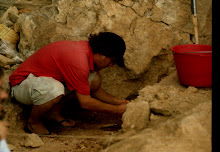This past Friday, December 1 2006, Dr. Bruce G. Trigger, James McGill Professor of Anthropology at McGill University, passed away in Montréal.
Professor Trigger’s stature in contemporary archaeology can hardly be overemphasized, as is readily seen by even a casual perusal a list of his innumerable publications spanning over four decades. When I was an undergraduate student at McGill, I had the good fortune of taking three classes from him, including most memorably “History of Archaeological Theory,” a course for which he had – quite literally – written the book. Here, I’m referring to Trigger’s magisterial A History of Archaeological Thought, a volume that frankly has no equal in archaeological literature.
I remember sitting in the first class of the course, in the first days of January 1998 (winter break was always cruelly short at McGill)… The first thing Prof. Trigger had us do was to write on the first page of the textbook – his book! – the following quote by D. Clarke, so as to make sure we never forgot just what we were doing as archaeologists:
“Archaeology is the discipline with the theory and practice for the recovery of unobservable hominid behavior patterns from indirect traces in bad samples.”
Only then, with a wry smile, did he launch into the course… which was promptly interrupted by a historic ice storm that shut down all of Montréal for two weeks. I spent much of those cold, wet days in the Second Cup on the corner of Saint-Denis and De Maisonneuve (one of the few places I could reach that still had power), devouring A History of Archaeological Thought and scribbling the first round of intramarginal notes and questions I’d inflict on my copy of the book over the years.
The course itself was a one-of-a-kind experience in learning about archaeology, but it’s mainly in retrospect that I truly came to appreciate the considerable impact Trigger’s thinking had on me, as I referred time and again to his book and to the copious notes I took during that fateful semester. As I turned in my dissertation this week, some of which discusses the influence of nationalism in predisposing people to accept some interpretations of the record as more probable than other, I couldn't help but pause and realize just how strongly the influence of Trigger’s teaching still permeates my work today.
With the news of his untimely passing, I realize too late that I never really got around to thanking him fully for some of the things he did for me (including writing a reference letter that I’m sure played no small part in getting me into grad school), or seizing the chance to ask him some questions I had always wanted to explore in greater depth. So, if belatedly, thank you for everything, Professor Trigger… to say you were an inspiration is a vast understatement, and you will be immensely missed.
An Artificially Intelligent Pseudoarchaeologist?
7 months ago

No comments:
Post a Comment